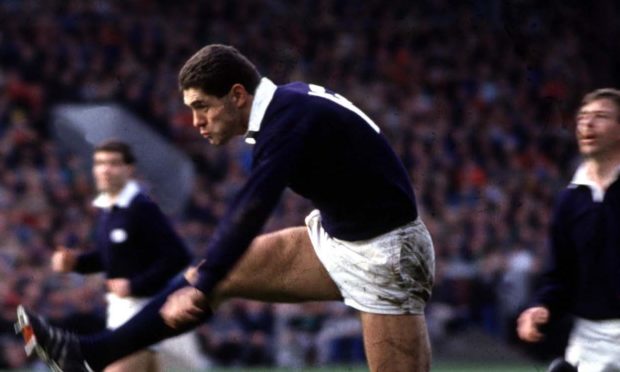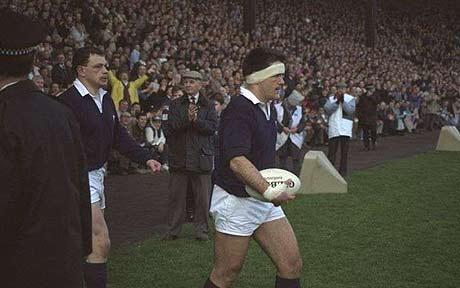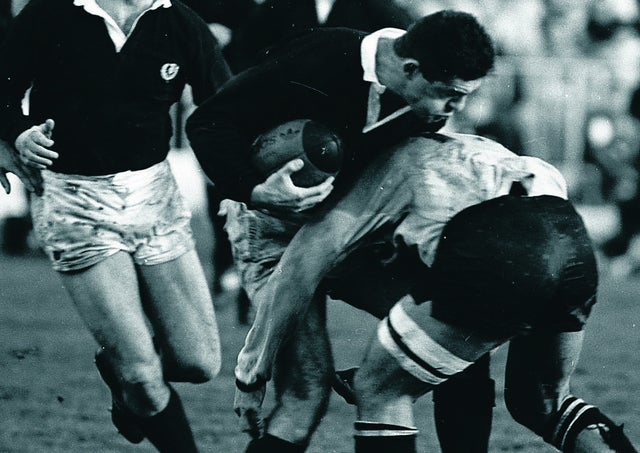It was one of those moments which demonstrated the wafer-thin margins in international sport – and those of us who were there have never forgotten the anguish which reverberated round a stadium.
On October 26 1991, an army of us travelled to Murrayfield with a spring in our step as we eagerly anticipated the World Cup semi-final meeting between Scotland and England. This was just 19 months after the same sides had met at the same venue and David Sole and his troops performed their famous slow march on to the pitch as the prelude to winning the Grand Slam.
Most of the combatants were the same, but this was a different type of occasion. For starters, both line-ups were trying to reach their first-ever final in the global tournament which had been launched only four years earlier, so this was uncharted territory, but there was little sign of the arrogance and jingoism which had previously surrounded Will Carling’s men.
And there was also a mutual respect between the two camps, with many of the leading lights having toured together on their triumphant British & Irish Lions tour of Australia in 1989. The pundits might have engaged in pre-match predictions, but the teams preferred to do their talking where it counted.
Given the prize at stake, it was probably unsurprising that the contest itself was a bruising battle of wills and incessant kicking, unimpeded by any such considerations as creativity or champagne rugby.
Tension enveloped the occasion
These redoubtable players knew each other’s strengths and weaknesses, they had already been involved in several nerve-shredding encounters, and experimentation was off the table.
All that mattered was the result and with the Auld Enemies tied at 6-6 just after the hour mark – Gavin Hastings and Jonathan Webb had both notched a brace of penalties – there was a feeling around the arena that the next score would be crucial to the outcome as the atmosphere grew ever more tense.
What happened next is forever etched in the copious chronicles of Scotland’s great what-might-have-been stories.
The hosts, fired up and on the offensive, surged deep into English territory and, as their opponents struggled to stem the tide, won a penalty which, in any other circumstances, should have been meat and drink to somebody with Hastings’ impressive pedigree and kicking skills.
A thrill went through the crowd
The ITV commentator summed up the views of the supporters – “I don’t think anybody in the English team believes that Hastings will miss this” – while the renowned full-back received some treatment from the physio, following a heavy clash with Micky Skinner. Soon enough, he was back on his feet.
These next few seconds passed in a whirl of different emotions. There was expectation as he lined up his attempt, inside the 22, and at the sort of distance and angle which made it look straightforward. Exhilaration, as he got ready to complete the formalities, while thousands of us prepared to respond with a giant crescendo which would have been heard in Fife.
And then, there was excruciating agony as we watched Hastings slice the penalty wide and the sound of groans and gasps of disappointment when we realised the opportunity had been squandered and the match was still tied.
Even now, 30 years later, the sting still hurts. It wouldn’t do to apportion excessive blame on this giant character who achieved so much in his career from 1986 to 1995, but I’ve never changed my opinion that if he had landed that attempt, the Scots would have seized the momentum, thrived on the positivity of the crowd and advanced to the final in Twickenham a week later.
Instead, the mood in the auditorium distinctly changed, the myriad renditions of Flower of Scotland sounded less intimidating than they had done before and England sensed their moment had arrived.
They still found if difficult to make any genuine headway in terms of breaching the home defence, but their pack rumbled through the gears, orchestrated a drop goal chance for Rob Andrew, and the stand-off calmly pushed his men 9-6 in front.
One old worthy, sitting close to me in the press box, turned and said sadly: “That’ll be that, then”. Another chap simply shook his head. And although the Scots continued to fling themselves into the fray with a furious passion, there was no way back for them. England would journey to the denouement in London, where they were narrowly beaten 12-6 by the Australians.
To his credit, Hastings has always admitted it was the biggest blow in his illustrious career.
As he said: “I’d kicked two out of two prior to that. I was down and, all of a sudden, I got up and probably wasn’t ready to take the kick.
“The physio came onto the field and was using the cold sponge on me. Clearly – with hindsight – Craig Chalmers should have taken it.
“But if anyone was going to miss it, I’m glad that it was me.”
Nobody could have known it at the time, but the defeat spelled the end of an era.
Scotland met the All Blacks in the third-place play-off in Cardiff a few days later and were edged out 13-6 in a tussle which proved to be the last time stalwarts such as John Jeffrey and Finlay Calder represented their country.
In the intervening period, the SRU’s finest have never reached another World Cup semi-final, so nothing should detract from that collective’s achievements.
But there’s still the nagging feeling that Sole could have been lifting the Webb Ellis trophy on November 2 if that blasted penalty had been converted.


